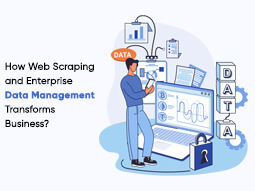Big Data Analytics For the Tourism Industry: How It Transforms the Travel Experience
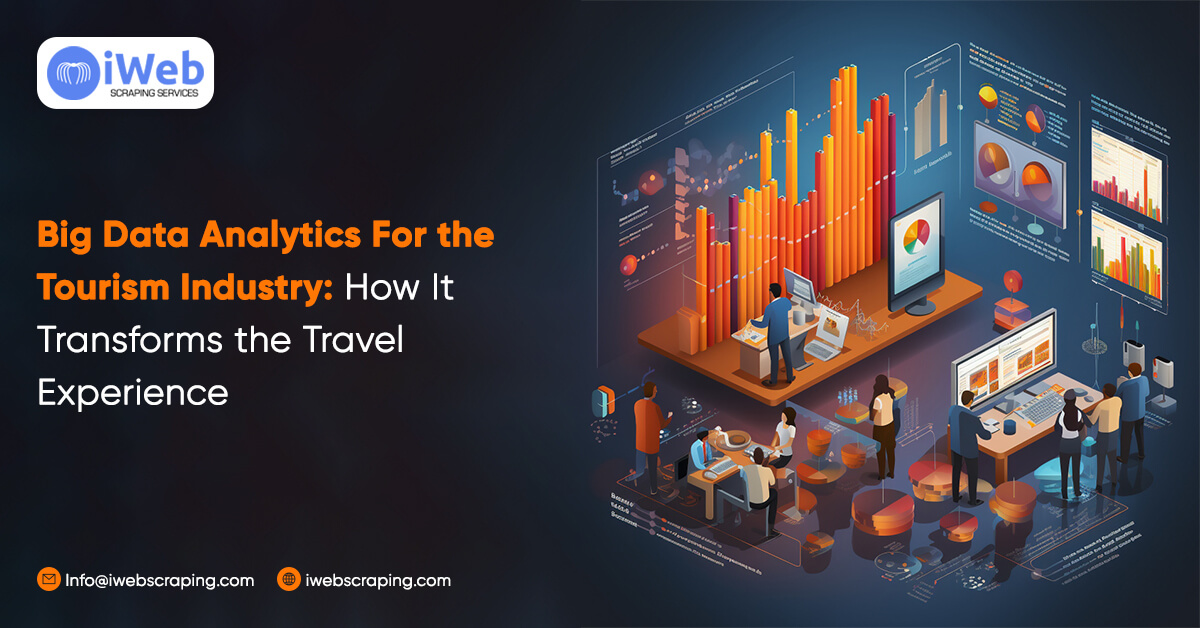
In the tourism industry and other industries, data is a key contributing factor to strategic decisions. It serves the purpose of forecasting customer needs and facilitating the personalization of the services provided while also influencing marketing and pricing strategies.
There are a lot of data sources that big-data integration has with AI and smart learning systems. This combination, on the one hand, allows analyzing a potentially huge amount of even terabytes of data automatically, thus finding some patterns and discoveries. iWeb Scraping can perform effective analysis by using data from hotels to learn which activities can make visitors have good trips or people's past travel experience to work out where he or she is likely to choose for further trips.
What is Data Analytics?
Data analytics is a technique of processing data to obtain vital information and to identify the patterns. Such an operation consists of collecting much data from various places, for example databases, social media and websites, cleaning it up, and arranging it in a definite order. Once that, data mining methods apply to obtain a set of useful data. For example, make processes less chaotic and show up with issues that need to be addressed. In addition, data analytics will be facilitating the forecast and the probable events oncoming so that companies will be aware and management decisions will be made ahead of time.
What is Big Data Analytics in the Travel Industry?
Big Data Analytics in travel industry revolutionizes the travel industry by harnessing vast amounts of data to drive innovation and competitiveness. By delving into extensive data pools covering booking trends and traveler preferences, travel companies optimize operations and services. With big data, these businesses not only anticipate and fulfill customer needs efficiently but also pinpoint areas for enhancement and creativity.
Data analytics helps businesses by quickly finding patterns and trends. This helps them change prices fast, make customers happier, and avoid problems. It also helps them make services and ads that fit each customer, making customers like the business more. Embracing big data analytics signifies a shift from reactive to proactive strategies, enabling businesses to forecast and shape their future endeavors. In a landscape craving personalized and streamlined services, the significance of data analytics in travel industry is more prominent than ever. Thus, travel entities must leverage this capability to maintain a competitive edge.
What Are The Types Of Big Data Analytics Assists Travel Industry
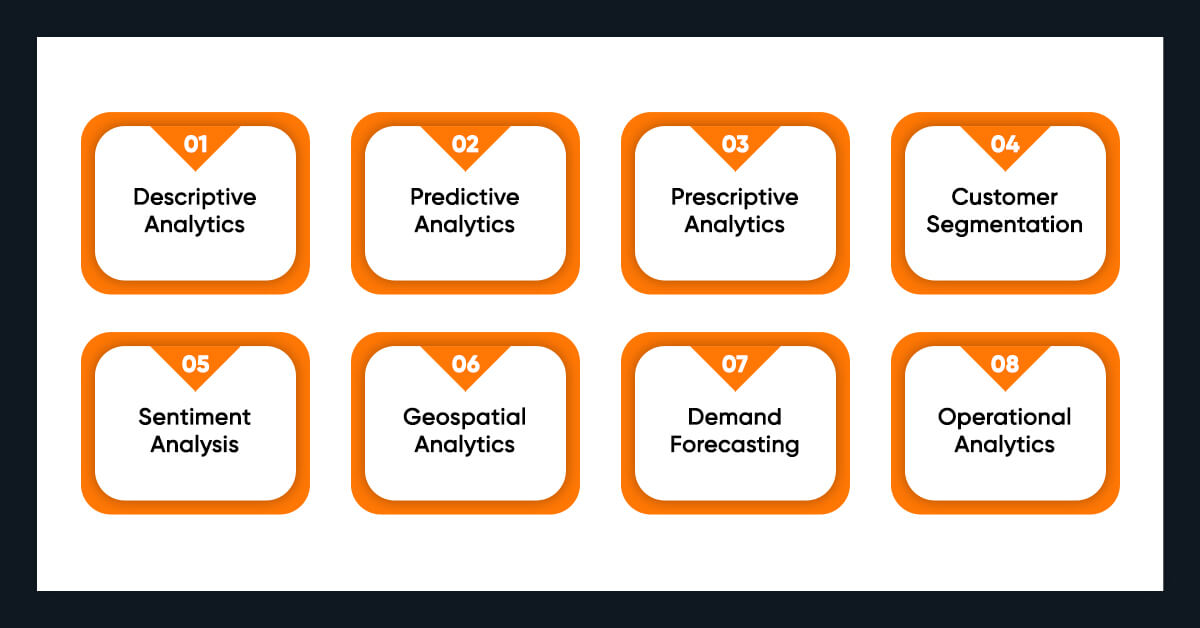
With the help of this big data analytics, companies can know how they work, whom they are serving, and what’s the current market situation. Connecting and discovering the trends in the data facilitate businesses to do things in a better way.
Lets understand its types to evaluate its efficiency for travel industry:
Descriptive Analytics
This is about looking at old information to understand what happened before. In tourism, it helps businesses see things like which places were popular, when people traveled the most, and who traveled where.
Predictive Analytics
This is guessing what might happen next based on what happened before. For tourism, it means using past data to guess things like how many people might want to travel to a place in the future or how busy hotels might get.
Prescriptive Analytics
This is about giving advice on what to do in the future based on predictions. For tourism, it could be suggesting the best prices to set for hotel rooms or when to promote travel packages to get more bookings.
Customer Segmentation
This is sorting tourists into different groups based on things they have in common, like age or what they like to do on vacation. It helps tourism businesses know how to target their marketing and services to different types of travelers.
Sentiment Analysis
This is about figuring out if people feel good or bad about something by reading what they say online. In tourism, it's used to see how tourists feel about destinations, hotels, or attractions, which helps businesses improve.
Geospatial Analytics
This is using maps to see where tourists go and how they move around. It helps tourism businesses understand where people like to travel and how to plan things like tours or attractions.
Demand Forecasting
This is guessing how many people will want to travel somewhere in the future. It helps tourism businesses plan things like how many hotel rooms to have available or when to offer discounts to attract more visitors.
Operational Analytics
This is about making sure things run smoothly within tourism businesses. It is used to identify problems and improve operations, such as enhancing booking systems or ensuring there is adequate staff to assist guests.
Uses of Data Analytics in the Travel Industry
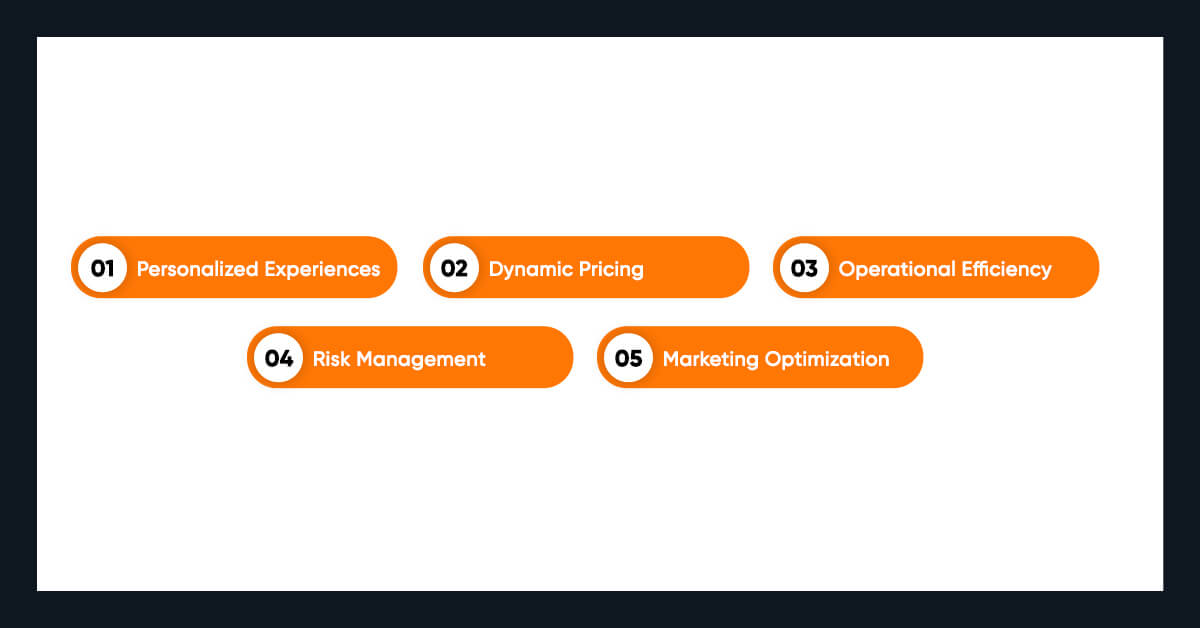
Data analysis is the most significant segment of the travel business since it renders loads of useful items to improve travel conditions of customers and to make more money for travel companies.
Personalized Experiences
This entails data mining for each passenger's preference. Having discovered their preferences makes their trip unique and amazing for the individual. Eg. Airlines can recommend flights based on your recent experiences while hotels can surprise you with upgrades and free treats; Your past experiences will activate them to fulfill your dream.
Dynamic Pricing
This is all about the price moves determined by the trends of the moment. Thereby, the cost per km will increase when there is a greater demand as more people than usual seek a ticket to fly. Return this with, for example, if a hotel finds that there are a few rooms that are empty, they will reduce the price to attract more people.
Operational Efficiency
As for these, it is more about having a well-oiled machine. Companies can get to know how to make the reservation system efficient, manage well, and be able to budget the company's activity by using the data to its best. For instance, airlines may find out the best times to fly travelers based on what travel time is most common and hotels might decide how many excess staff they might need in relation to what number of rooms are booked.
Risk Management
For managing risks, it is important to use data to stay updated and deal with the emerging issues. To give a local picture, if the weather is going to be bad, the airlines may change the flight schedules to make an exemption for people's safety, and the hotels may make the guests change their plans easily if necessary.
Marketing Optimization
It is all about data and finding what buyers like with the offer of buying related products. The next thing I may discuss is the fact that a travel company could write emails or ads targeting people who like to do outdoor activities, or think of awarding extra points to the customers who travel frequently.
What are the Data Utilized in the Travel Industry
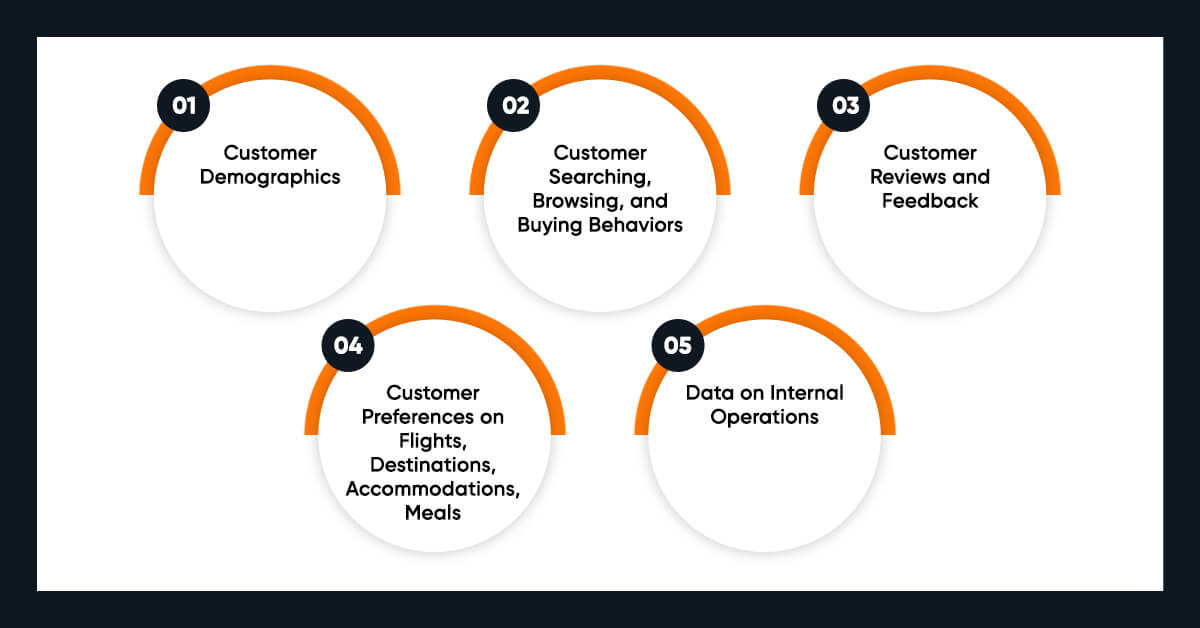
There are various types of data analytics that can be used in the travel industry to ensure smooth business operations. This data can be used to customize travel plans to customers based on their requirements.
Let’s evaluate data types important for travel segment:
Customer Demographics
This means details about travelers like their age, gender, where they live, how much money they make, and if they have a family. Knowing this helps travel companies offer things that suit different groups of customers.
Customer Searching, Browsing, and Buying Behaviors
This is about how people look for travel options, what they look at, and what they end up buying. By studying this, companies can make their websites better, improve their search tools, and show ads that match what customers want.
Customer Reviews and Feedback
This is what customers say about their experiences, either on websites like TripAdvisor or in surveys. It helps companies understand what customers like and what they don't, so they can make things better.
Customer Preferences on Flights, Destinations, Accommodations, Transportation, and Meals
This is about what travelers prefer when it comes to things like airlines, where they want to go, where they want to stay, how they want to get around, and what they want to eat. By knowing this, companies can suggest things that match what each customer likes.
Data on Internal Operations
This includes details about how the travel business works on the inside, like managing inventory, deciding how to use resources, how many staff to have, and how well they're doing. Understanding this helps companies make things run smoother, be more efficient, and spend less money.
What are the Challenges in Collecting Data in Travel and Tourism?
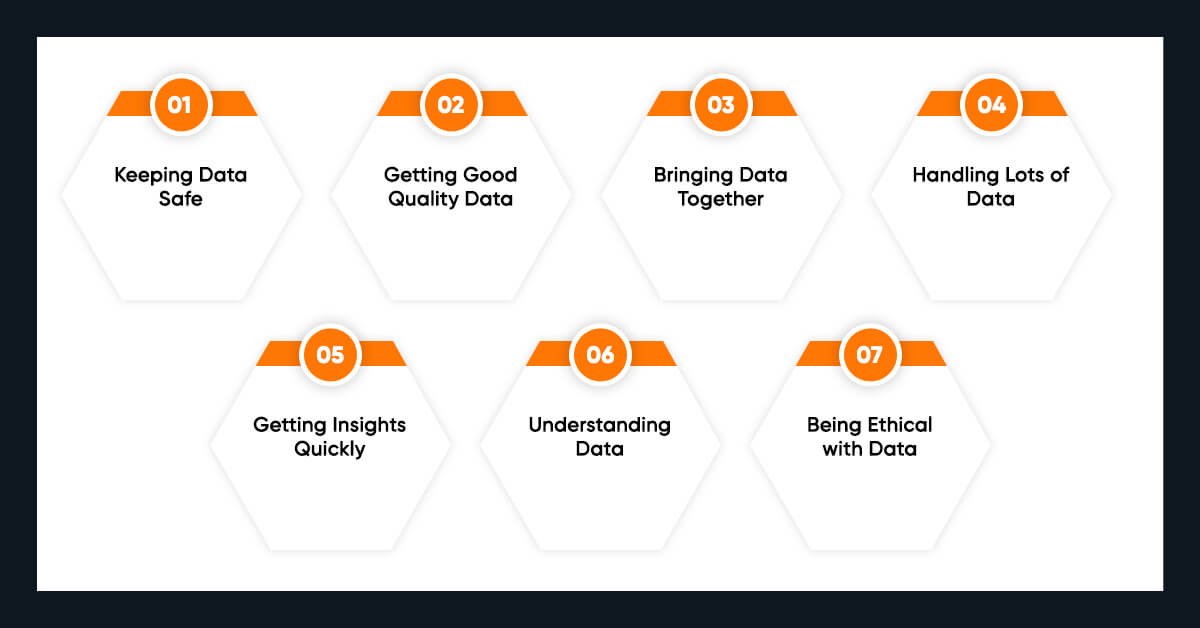
Data collection is responsible for smoothing the operations of the travel industry. This data can be collected using diverse tools and techniques based on the requirements. But it has also some challenges while gathering a vast amount of data for the Travel and tourism segment:
Keeping Data Safe
One major challenge is making sure that customer information stays private and secure. Travel companies gather lots of personal details like bookings and payment info, so they need to follow rules like GDPR and use strong security to prevent data leaks or hacking.
Getting Good Quality Data
Sometimes the data collected isn't perfect, which makes it hard to make good decisions. If data is wrong or missing bits, it can lead to mistakes in analysis. Companies need to check and clean up their data to make sure it's accurate and reliable.
Bringing Data Together
Travel companies often have data stored in different places, which makes it tricky to put it all together for analysis. They need smart strategies and tools to combine data from booking sites, customer databases, and other sources to see the big picture.
Handling Lots of Data
There's so much data in the travel industry from bookings to social media posts – that it can be overwhelming. Companies need strong systems to manage and process all this data without getting overwhelmed.
Getting Insights Quickly
With customers wanting instant answers and personalized experiences, travel companies need to analyze data in real-time. This means they have to be quick at understanding data from websites, apps, and other sources to make fast decisions.
Understanding Data
Sometimes, data can be complex, with lots of different parts to figure out. Travel companies need skilled analysts who can make sense of all this data and find useful insights to help them make good decisions.
Being Ethical with Data
It's crucial for travel companies to use data in a fair and responsible way. They should respect customers' privacy, get permission before collecting data, and use it honestly and openly. Ethical rules and guidelines help ensure data is used in the right way.
Conclusion
Data analytics in the tourism industry could also be a valuable tool in the travel and tourism industry. It helps companies improve customer experiences, spot upcoming trends, set fair prices, work more efficiently, handle risks, see how well their ads are doing, and help protect both the business and the environment. They collect different types of data like bookings, personal details, past trips, money stuff, what customers say, how they act, loyalty program info, social media posts, where people are, and other outside information. But collecting data comes with problems like keeping it private, making sure it's good quality, putting it all together, handling a ton of it, looking at it quickly, understanding what it means, and using it in a fair way. iWeb Scraping Services follows strict rules and techniques about data to fix diverse problems. It helps make sure data is good, safe, used the right way, and helps the company make smart decisions.

